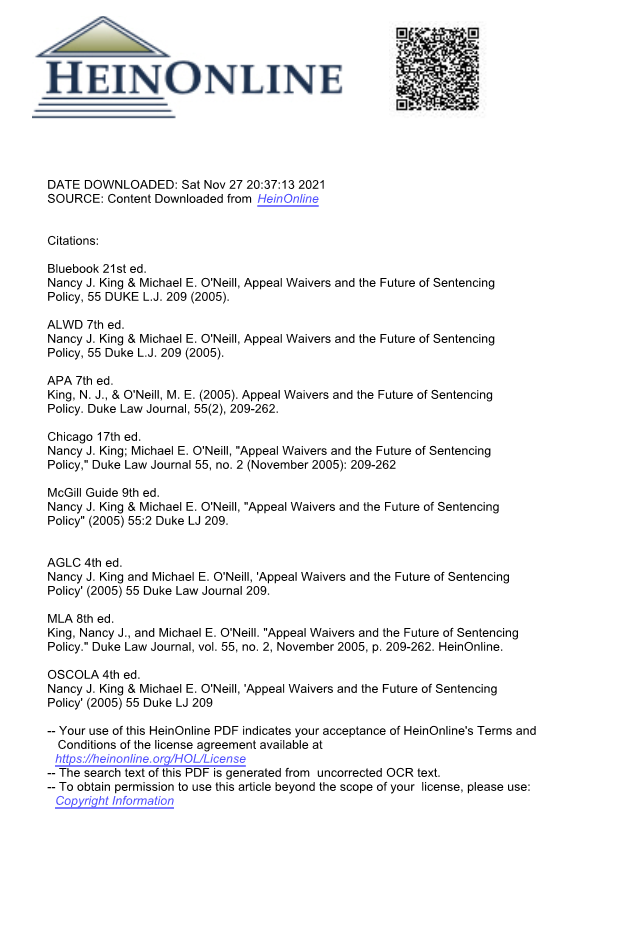论被告人认罪认罚的上诉权
摘要:认罪认罚制度作为一项相对较新的制度,还存在一些值得改善的方面,本文主要通过对记载外国类似制度的文献整理,探寻外国对此制度的立法与实践。
关键词:辩诉交易; 有罪答辩; 上诉权;美国; 德国
- 美国有罪答辩制度下被告人的上诉权
美国的有罪答辩制度规定:被告人可以在做出有罪答辩后,法院做出生效判决前撤回。一旦法院宣告了刑罚,被告人就不能再撤回有罪答辩,但可以通过上诉或者申诉程序要求撤销。不论被告人作出的是有罪答辩还是无罪答辩,他们都能对量刑提出上诉,但原则上只有作出无罪答辩的被告人才有权对定罪提出上诉。
在美国的司法实践中,美国联邦和州司法系统与被告人达成的辩诉协议通常会要求作有罪答辩的被告人放弃上诉权,包括对量刑问题的上诉。经过学者的调查结果表明:在通过认罪协议处理的案件中,有近三分之二案件的被告人放弃了上诉权,因此上诉率相比于之前有了很大程度上的下降 。[1]但是允许被告人与司法系统协商放弃上诉权这一行为的正当性也面临着一些专家学者的质疑,他们认为首先,限制被告人的上诉权是一种不合法的行为,涉嫌违宪。其次,被告人对上诉权的放弃相当于放弃了挽回未来潜在错误的机会,因为被告人在放弃上诉权时不可能知道抗辩程序与最后判决中可能发生的情况,所以让被告人放弃质疑未来错误的可能性是不合理的。再次,弃权条款不是一个准确的称述,而模糊的表述不能构成合同中有约束力的条款,所以放弃上诉权的条款无法生效。最后,被告人放弃上诉条款削弱了上诉审查的监管能力,不恰当的扩大地方法院的权限。
但是主流观点还是赞同被告人可以通过协商放弃上诉权。他们的理论依据在于,首先,作出有罪答辩的被告人明知、自愿地放弃上诉权,不仅符合正当程序的要求,也符合及时终结诉讼、节约司法资源的公共利益,还是合同法上诚实信用原则的内在要求。其次,通过数据表明,司法机关在面对签署弃权书的被告时,往往会给予他相较于其他被告而言更加宽大的处理,超过五分之一的豁免案例,除了可以获得实质性援助之外,还将获得定罪量刑标准线向下的偏离。最后,一份辩诉交易协议的完成,往往经过了事无巨细的讨论,双方对案件的细节都已达成共识。
而在实际运用时,即便被告人与司法机关未达成放弃上诉权的协议,被告人提起上诉,往往也会被法院驳回起诉,甚至有可能会加重要承担的刑罚。这种规定使作出有罪答辩的被告人事实上几乎失去了上诉权。
- 德国辩诉交易制度下被告人的上诉权
二十世纪七十年代中后期,德国在司法实践中产生了认罪协商的做法,即被告人通过当庭作出有罪供述来换取司法审判时的从轻量刑,后来认罪协商的范围不断扩大,在应用这一制度时,德国认罪协商通常都包含被告人放弃上诉权的内容。德国法院往往在一开始就会参与辩诉谈判,虽然法院不被鼓励去让被告人做出放弃上诉权的承诺,但是议价弃权原则是被普遍承认的。[2]这一原则的具体实施步骤为:法官在适当情况下启动与辩护律师的认罪协商,在听取辩护律师与检察官的意见后,依据案件事实证据给被告作出一个大致的量刑区间,其间被告人可以在承诺放弃上诉权,经过法院的确认后,放弃上诉权的决定成立。在双方当达成一致的协商意见后,法官依据协商结果对被告人从宽处罚。
三、总结
英美法系与大陆法系对于这一类案件中被告人的上诉权都在一定程度上予以限制,只允许被告人在某些特定情况上诉。理由是因为协议的达成是司法机关与被告人合意的结果,如果任由被告人上诉,会造成司法资源不必要的浪费。不同的是英美法系适用这一制度的范围更广,而大陆法系一般会限定协商的案件范围,并且通过法律规定被告人可以上诉的情形。虽然这些国家地区的制度与我国存在着一定的差异,但是从他们的实践经验可知,对被告人上诉权的适当限制是合理的,未来我国的认罪认罚制度也可以参照外国先例,对被告人的上诉权进行一定的限制。
外文文献出处:1、Bundesgerichtshof (German FederalCourt of Appeal [OrdinaryJurisdiction]): GroJ3er Senat fur Strafsachen (Great Criminal Senate)
Nancy J. King & Michael E. Orsquo;Neill
Decision of 3 Mfarch 2005: Case No. GSSt 1/04
2、Duke LawJournal VOLUME 55 NOVEMBER 2005 NUMBER 2
附外文文献原文
文献一:外文参考文献1.pdf
文献二:
Bundesgerichtshof (German FederalCourt of Appeal [OrdinaryJurisdiction]): GroJ3er Senat fur Strafsachen (Great Criminal Senate)
Plea Bargaining: Waiver of Right to Appeal
Decision of 3 Mfarch 2005: Case No. GSSt 1/04
The 3rd Criminal Senate of the Bundesgerichtshof was hearing two appeals concerning drugs offences where the defendants had declaredwaivers of their right to appeal following bargains. It remitted the cases to the Great Criminal Senate of the Bundesgerichtshof (BGH), an enlarged judicial panel that decides on conflicts of opinion between the different ordinary criminal senates of the court. In the first case, the waiver was part of the deal before judgment was pronounced, and in the second case the waiver was declared after judgment, but the court had declared prior to judgment that a waiver would be considered desirable. The question for the Great Criminal Senate was whether a bargained waiverwas in principle per missible.
HELD, A BARGAINED WAIVER IS IN PRINCIPLE PERMISSIBLE, but that the
trial court must not in any way encourage the defendant to declare such a waiver, indeed it must not even take part in any negotiations to that effect; a court must never include a waiver in a pre-judgment bargain, such a waiver is void per se (unlike in most common law jurisdictions, the court in Germany is involved in the plea negotiations from an early stage). It must give the defendant a qualified warning after any judgment based on such a bargain, that notwithstanding the bargain he may appeal the judgment, regardless of whether the waiver was part of the
deal or not. The waiver will only become binding if the defendant declares it after he or she has been given such a qualified warning. A binding waiver by all parties concerned makes the judgment final and enforceable immediately.
COMMENTARY
The BGH is a court of final appeal in the ordinary jurisdiction (criminal and civil cases) and decides on questions of law only. (The original decisions of the BGH since the year 2000 can be accessed at and downloaded free of cost from the courts website www.bundesgerichtshof.de (accessed 29 September 2005) in the folder Entscheidungen, by entering the date and/or the case number; there is also a keyword search engine available.) There are other Federal Courts of Appeal in the following special jurisdictions: administrative, social, employment and tax courts.Cases such as the present one usually come to the BGH on appeal under
the procedural heading of whether appeal waivers by the defendants as part of the bargain were valid or not. German procedure does not know I he Journial of C;rimninal La it,guilty pleas in the common law sense (where they immediately end the trial proper as such), and especially not the phenomenon of charge bargaining. Bargains usually only pertain to matters of sentencing and are based on admissions of fact by the defendant. (For a brief overview on the German bargaining system and the previous jurisprudence of the BGH, see M. Bohlander, Plea-bargaining before the ICTY, in R. May,D. Tolbert et al. (eds), Essays on ICTY Procedure and Evidence (Brill Academic Publishers: Leiden, 2001) 151 at 159-60.) There are, however,provisions that allow a court provisionally to drop charges related to minor offences, for example, if the sentence to be expected if the more serious charges are proven is sufficiently commensurate with the overall degree of guilt of the defendant. This can be used as a form of limited charge bargaining, i.e. the co
剩余内容已隐藏,支付完成后下载完整资料


英语原文共 55 页,剩余内容已隐藏,支付完成后下载完整资料
资料编号:[596756],资料为PDF文档或Word文档,PDF文档可免费转换为Word


